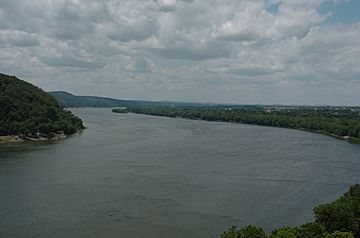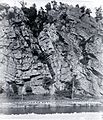Chickies Ridge facts for kids
Quick facts for kids Chickies Rock |
|
|---|---|

View from on top of Chickies Rock looking out over the Susquehanna River.
|
|
| Highest point | |
| Elevation | 525 ft (160 m) |
| Geography | |
| Location | Lancaster County, Pennsylvania, United States |
| Parent range | Chickies Ridge |
| Topo map | USGS Columbia West |
Chickies Rock is a famous spot in Lancaster County, Pennsylvania. It's a large rock that sticks out, offering amazing views of the Susquehanna River. This rock is the western end of a long hill called Chickies Ridge, located in West Hempfield Township. It's a popular place for outdoor fun and learning about nature.
Contents
What is Chickies Rock?
Chickies Ridge is a long, narrow hill. It stretches for miles in Lancaster County, Pennsylvania. Chickies Rock is the very end of this ridge. It stands high above the Susquehanna River. The ridge is part of the Hellam Hills, but the river cut a path through them. This created a "water gap" that separates Chickies Ridge.
The Rocks Themselves
The rocks at Chickies Ridge are very old. They were formed during the Cambrian period. This was about 500 million years ago! The rocks were pushed up over time. Chickies Rock is special because it shows a huge fold in these rocks. Geologists call this a large "anticline." It is one of the biggest exposed folds on the East Coast. The highest point of the ridge is about 587 feet (179 meters) above sea level.
Chickies Creek flows along the north side of the ridge. Jones Run flows along the south side. Both creeks run towards the western end of the ridge.
History of Chickies Rock
Chickies Rock has a rich history. It has been important to people for a long time.
How it Got its Name
The name "Chickies" comes from the Lenape people. They were Native Americans who lived here. Their word "Chiquesalunga" meant "place of crayfish." This is where Chickies Creek got its name. The rock and ridge were then named after the creek.
Old Roads and Trails
Chickies Hill Road was one of the first roads over the ridge. It was a winding road with sharp turns. It went from Columbia to Marietta. Later, Pennsylvania Route 441 was built. It cut directly through the ridge. This made the climb much easier for travelers.
Civil War Observation Post
During the American Civil War, Chickies Rock was important. In 1863, the Gettysburg Campaign was happening. The Union army used Chickies Rock as a lookout spot. They watched the Confederate army across the river in Wrightsville. It was a key place to see what was happening.
The Old Trolley Park
In 1893, a trolley company built tracks up the ridge. This was the Columbia and Donegal Electric Railway. They built an amusement park called Chickies Park. It was right on top of Chickies Rock! Imagine riding a trolley up to a park with amazing views. The trolley line was very steep. It ran for 1,900 feet (579 meters) on a 6% slope. The park opened on July 1, 1893. The trolley line was later extended to Marietta. But the trolley line closed down on April 25, 1932.
Local Legends
There is a local legend about Chickies Rock. It's a sad love story. It's like a version of Shakespeare's Romeo and Juliet. This story tells of a Native American maiden and a white settler. It's a tale passed down through generations.
Trails and Fun Activities
Chickies Rock is a great place for outdoor adventures.
Rock Climbing
Many people come to Chickies Rock for rock climbing. The steep cliffs offer a challenge for climbers. It's a popular spot for this exciting sport.
Hiking Trails
The area west of Chickies Hill Road is part of Chickies Rock Park. This park is owned by Lancaster County. There are several trails to explore:
- The Chickies Rock Overlook Trail leads to the top of Chickies Rock. It starts from Route 441. This trail roughly follows the path of the old trolley line.
- The Clayton Shenk Trail crosses Jones Run. It climbs up the south side of the ridge. Then it drops down the north side to Chickies Hill Road.
Plant Life
Chickies Rock is home to special plants. One rare fern grows there. It is called Bradley's spleenwort. This fern is not found in many other places in the eastern U.S.
Images for kids
 | Bessie Coleman |
 | Spann Watson |
 | Jill E. Brown |
 | Sherman W. White |





